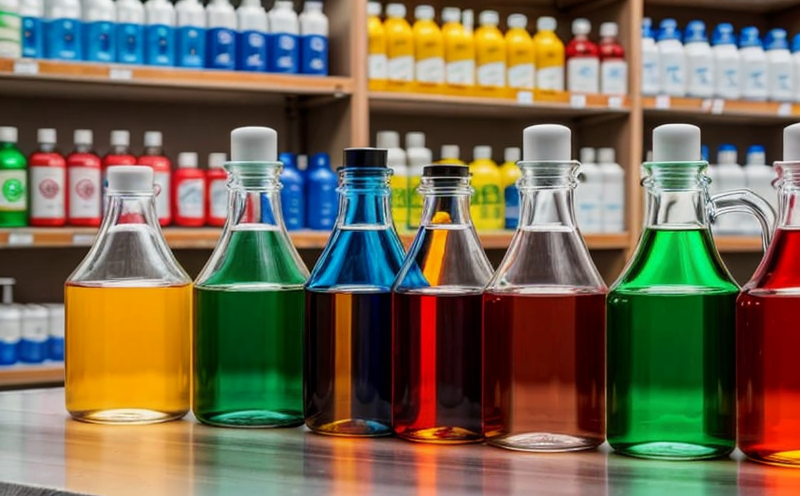Verification of sustainable fabrics under REACH regulation
The Registration, Evaluation, Authorisation and Restriction of Chemicals (REACH) regulation is a cornerstone in ensuring that textiles comply with European Union standards for the safe use of chemicals. Compliance with this regulation is not only crucial for maintaining access to EU markets but also for aligning with global sustainability trends.
Our service specializes in verifying sustainable fabrics by assessing their compliance with REACH, focusing on restricted substances and hazardous materials present in textile products. This verification process ensures that the textiles are safe from a chemical perspective, contributing significantly to the overall environmental responsibility of manufacturers and importers.
The testing involves rigorous analysis using advanced techniques such as GC-MS (Gas Chromatography-Mass Spectrometry), LC-MS/MS (Liquid Chromatography-Tandem Mass Spectrometry), and HPLC (High Performance Liquid Chromatography). These instruments allow for precise identification and quantification of restricted chemicals, ensuring that the fabric meets the stringent requirements set by REACH.
Our team of experts employs international standards such as ISO 17025 to ensure accuracy and reliability in our testing methods. Compliance with these standards guarantees that the results are credible and can be trusted by all stakeholders involved in the supply chain, including retailers, consumers, and regulatory bodies.
The process begins with thorough specimen preparation, which involves careful sampling of the fabric to avoid any contamination or bias. This step is critical as it ensures that the sample accurately represents the fabric being tested. Once prepared, the samples undergo a series of tests designed to identify the presence of restricted chemicals under REACH. The results are then meticulously documented and reported in accordance with international standards.
Our service plays a pivotal role in promoting sustainability by helping manufacturers ensure their products meet stringent chemical safety requirements. By adhering to REACH, we contribute to reducing environmental impact and protecting human health. This not only enhances the reputation of the manufacturer but also builds trust among consumers who value sustainable practices.
International Acceptance and Recognition
The verification process for sustainable fabrics under REACH is widely recognized across international standards, ensuring that manufacturers can export their products to various markets with confidence. Our service aligns its methodologies with internationally accepted benchmarks such as ISO 17025, which guarantees the highest level of quality in our testing procedures.
ISO 17025 accreditation ensures that our laboratories are equipped with state-of-the-art facilities and highly trained personnel capable of delivering accurate and reliable test results. This standardization not only enhances our credibility but also streamlines the process for clients seeking compliance verification under REACH.
The acceptance of REACH-compliant products in global markets is a testament to the robustness of our testing protocols. Many countries around the world have adopted similar regulations, making compliance with REACH essential for international trade. By ensuring that our services meet these high standards, we facilitate seamless market entry and expansion opportunities for our clients.
Our commitment to international acceptance extends beyond regulatory compliance; it encompasses a broader mission of promoting sustainable practices in the textile industry. Through our efforts, we contribute to reducing environmental impact and fostering a healthier planet. This is achieved by helping manufacturers produce fabrics that are safe from harmful chemicals, thereby supporting global sustainability goals.
Environmental and Sustainability Contributions
The verification of sustainable fabrics under REACH regulation aligns closely with environmental protection initiatives aimed at reducing the ecological footprint. By ensuring compliance with REACH, we help manufacturers minimize their impact on the environment by eliminating hazardous chemicals from textile production processes.
This commitment to sustainability is reflected in our use of advanced analytical techniques that not only detect restricted substances but also provide insights into potential alternatives and safer chemical formulations. Our team works closely with clients to develop innovative solutions that enhance product safety while maintaining quality standards.
The adoption of sustainable practices by manufacturers can lead to significant environmental benefits, including reduced waste generation, lower energy consumption during production, and improved resource efficiency. By leveraging our expertise in chemical testing under REACH, we empower businesses to make informed decisions that contribute positively to the environment.
Our service also supports recycling initiatives by identifying components of textile products that can be recycled without compromising their integrity or safety. This holistic approach ensures that every aspect of fabric production contributes towards a more sustainable future. Through our efforts, we aim to inspire and enable other industries to adopt similar practices, fostering a culture of environmental responsibility.
Use Cases and Application Examples
| Use Case | Description |
|---|---|
| Supply Chain Verification | We assist companies in verifying the chemical composition of fabrics sourced from suppliers to ensure compliance with REACH. |
| New Product Development | Our service helps R&D teams test new fabric formulations for hazardous substances before commercialization, ensuring product safety. |
| Compliance Audits | We conduct regular audits to ensure ongoing compliance with REACH regulations, providing peace of mind for manufacturers and importers. |
| Customer Complaint Handling | In cases where customers raise concerns about the chemical composition of fabrics, we provide independent testing results to resolve disputes. |
| Supply Chain Optimization | By identifying restricted substances in fabric components, we help companies optimize their supply chains for greater efficiency and sustainability. |
| Environmental Impact Assessments | We assist organizations in conducting environmental impact assessments by providing data on the presence of harmful chemicals in fabrics. |
| Compliance with Global Standards | Our service supports companies in meeting various global standards, including REACH, for safe and sustainable product manufacturing. |
| Social Responsibility Reporting | We help businesses incorporate chemical safety data into their social responsibility reports to enhance transparency and credibility. |
In each of these scenarios, our service provides critical insights that enable manufacturers to maintain compliance with REACH regulations while promoting sustainable practices. By leveraging advanced analytical techniques and adhering to international standards, we ensure that the fabrics tested meet strict safety requirements and contribute positively to environmental conservation.





